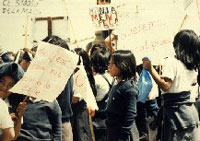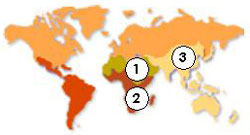| |
 |
 |
|
 |
 |
| Freedom of Expression and Participation |
 |
"Everyone has the right to freedom of opinion and expression; this right includes freedom to hold opinions without interference and to seek, receive and impart information and ideas through any media and regardless of frontiers." (Universal Declaration of Human Rights, Paris 1948, art. 19)
"Everyone has the right to take part in the government of his country, directly or through freely chosen representatives." (Universal Declaration of Human Rights, Paris 1948, art. 21) |
 Lack of political rights and freedoms is both a cause and a consequence of poverty. Socially and politically excluded people are more likely to become poor, and the poor are more vulnerable to social exclusion and political marginalization. Lack of political rights and freedoms is both a cause and a consequence of poverty. Socially and politically excluded people are more likely to become poor, and the poor are more vulnerable to social exclusion and political marginalization.
Political rights are usually defined as the right and opportunity to take part in the conduct of public affairs, directly or through freely chosen representatives. This includes the right to vote and to be elected in parliamentary and other elections, to have views represented before decision-making bodies, and the right of equal access to public service. Political freedoms include essential democratic rights such as freedom of speech, expression, information, association, assembly and the media. While political rights are usually restricted to citizens, political freedoms are general human rights to be equally enjoyed by all human beings, regardless of citizenship or other status.
Information
The right to seek and receive information establishes the duty of Governments to provide the poor, and their freely chosen representatives, with all relevant information concerning governmental activities and services. This includes information in respect of governmental services that are essential for the poor, such as access to education, health services, employment services, social security, administration of justice and the political decision-making processes.
Freedom of expression
The right to freedom of expression guarantees the right of the poor and their representatives to express and impart any opinions, ideas or information, in relation to the Poverty Reduction Strategy process and in general, either orally, in writing or in print, in the form of art, or through any other media.
Political participation
Active and informed participation by the poor is not only consistent with, but also demanded by the rights-based approach to poverty eradication because the international human rights framework affirms the right to take part in the conduct of public affairs.
One may distinguish four stages of participation: preference revelation; policy choice; implementation; and monitoring, assessment, and accountability.
The stage of preference revelation is the initial stage of any process of policy formulation. Before policies can be formulated, people must be enabled to express what their preferences are, i.e. what objectives they want to achieve.
The stage of policy choice refers to the stage at which policies are formulated and decisions taken regarding the allocation of resources among alternative uses. As different patterns of resource allocation will serve the interests of different groups of people differently, a conflict of interest is inherent in any process of policy formulation. In whose favour this conflict is resolved depends very much on who can participate effectively in the process. Traditionally, the poor are left out, as they often do not possess enough political or financial power to make their interests count. A human rights approach must take steps to alter this situation, by creating a legal-institutional framework in which the poor can participate effectively in policy formulation.
Rather than mandating that the poor must take part in all technical deliberations that underlie policy formulation, the aim is to allow and promote participation of the poor in the process of setting priorities and benchmarks that guide such deliberations. In practice, this implies that as alternative policy options are being explored, the implications of these options for the interests of various population groups must be made transparent to the general public, including the poor in order that they have an opportunity to make a case for those options that best serve their interests.
Although the implementation of policies is primarily the responsibility of the executive branch of the State, opportunities must also be created that enable the poor to exercise their right to participate in the implementation stage. Such opportunities are most likely to arise in community-level activities, which are, in turn, more likely to flourish within an institutional framework of an active, representative local government. Decentralization of government and a deepening of democracy are therefore essential components of the human rights approach to poverty eradication.
The final stage of participation is that of monitoring and assessment of policies so that the State and other duty-bearers can be held accountable for their obligations. It is an essential feature of the human rights approach that the people who are affected by policies are able to participate in monitoring and assessing their success or failure and then take part in the procedures for holding the duty-bearers accountable. Appropriate institutional arrangements are needed for such participation to be possible.
 | Regional Implementation
This right is addressed by our projects in the following regions:- Africa - 2 projects
- Arab States - 1 project
- Asia and the Pacific - 3 projects
|
|
| |
Empowering marginalized adolescent girls in Bangladesh, India, Nepal and Pakistan to become agents of social transformation |
| |
Promoting of culturally appropriate policy responses to exploitative migration of women and children |
| |
Strengthening the most deprived communities in Benin, Burkina Faso, Mali and Niger |
| |
A comprehensive skill training and capacity building program to improve the socio-economic opportunities for marginalized youth in four Arab countries |
| |
Developing and promoting indigenous building technologies to promote poverty eradication in Central Asia and Afghanistan |
| |
Combatting poverty and promoting sustainable environments by enhancing local and indigenous knowledge in a global society |
| |
Poverty eradication by supporting indigenous communities in Indonesia through non-formal education and environmental management |
|
|
 |
 |
 Email this page Email this page  Printable version Printable version
|
 |
|
|

